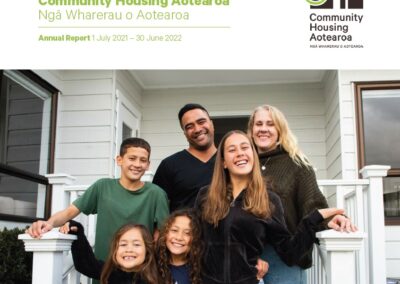Case Study_Monte Cecilia_FINAL

|
|
“Firstly, let me congratulate you all for trying to do something about the rising tide of homelessness and unaffordable housing.
“Rather than talk about the actual specifics of today’s straw man project I thought it might be useful for the audience to understand the greater macro issues that the construction sector faces and how this stops affordable housing from being available.
“I will share with you the perspective of the builder who feels hobbled and frustrated that so many needy, deserving families are not getting the opportunity good affordable housing provides.
“I have built hundreds of homes over many decades and have watched the market progressively tilt towards larger homes on smaller very expensive lots. Unfortunately, that is what our current system and market dictates. But it is woefully under delivering on what we need to house all New Zealanders.
“The key to creating affordable housing is the will by all parties to achieve this and a system that is flexible enough to deliver the outcome. Currently there are lots of political platitudes but an underlying system that is inadvertently skewed to only create high cost land and accordingly high cost homes. It is incapable of producing affordable land. It’s a pipe dream to think that the current system or market will produce affordable housing.
“If we want affordable housing we need to produce affordable land free of restrictive covenants and planning utopia. That will only come about by sidestepping the market and some of the feel-good niceties of planning and just getting on with pragmatically producing the housing and infrastructure needed.
“We produced mass social and affordable housing in the 1950’s and we need to do it again. Central government needs to acknowledge the problem then bite the bullet and make this possible. This is a crisis which needs a different approach, new rules and political fortitude. All of which have been lacking to date. What we have seen is political denial and nibbling around the edges. That is not going to solve the problem.
“As the speakers so eloquently put it yesterday continuing to ignore the social and health costs and not taking definitive action will far outweigh the cost of providing good housing and strong communities.
“Is the Resource Management Act helping? Although well intentioned it has morphed into a major stumbling block. Currently it is project specific and has no cognisance as to what the nation actually needs to house its people or what its impacts are on the financial viability of a project. It’s a cost plus model with the first person purchasing, paying the bill for infrastructure, GST and all manner of other local authority fees. The Resource Management Act, along with the 70 disjointed individual council district schemes, is an unsustainable model and one of the key drivers for conferences like this. You would not have seen this 30 years ago before the spiral to unaffordability started.
“Additionally since the introduction of the Building Act 2004, construction costs have soared, productivity has plummeted and much needed skilled people have left the industry.
“Why has this happened? Considerable administrative process has been forced into place but it is adding very little material value. Risk averse behaviour has turned once helpful local authorities into gun shy organisations spending the consumer money at every turn and slowing construction and planning down to absolve themselves of liability. This is destructive, expensive behaviour and the opposite of what is needed.
“In the last 15 years the cost of building has increased 110% while the general cost of living has increased only 44%. Much of this extra cost is the result of compounding regulatory change, council fees and unfairly imposed infrastructure cost.
“Many good operators within the construction industry have been worn down by the incessant regulatory creep and the often-petty way it is enforced. When they weigh up the risk and reward available from working within the industry many see easier options to make a living and move on accordingly. Taking much needed skills away from the industry leaving us shorthanded and looking for easier ways to build so that the semiskilled people left can still be utilised.
“Successive governments have given lip service to the importance of housing and construction. Either giving the ministerial portfolio to a minister outside of cabinet or to the minister of last resort. The lack of senior political presence at the conference (CHA-IMPACT 2017) is a poignant fact but not unexpected. The inherent outcome of this disinterest is the denial of the housing crisis and a system that doesn’t deliver to the needs of the people it is intended to serve.
“Change will only happen through collaboration between industry and policy makers but there must be a catalyst for change. I believe we have reached that tipping point. One would hope the collective deafening voice of the community housing organisations at this conference and the burgeoning number of disenfranchised would-be home owners, will help bring the politicians to account. Would get some long overdue action by depoliticising the issue and agreeing an across party accord on housing, a clean sheet approach is needed to start delivering the housing that our good people deserve.”
Download the pdf of this article here.2Mike Fox -Why we can’t produce affordabe housing.pdf
Community-Housing-Aotearoa_Media-Release_Westpac-Report_Affordable-Home-Ownership_23-July-2024-4.pdf
Community Housing Aotearoa (CHA) Monthly Newsletter – 8 July 2024
Community Housing Aotearoa (CHA) Monthly Newsletter – 10 June 2024